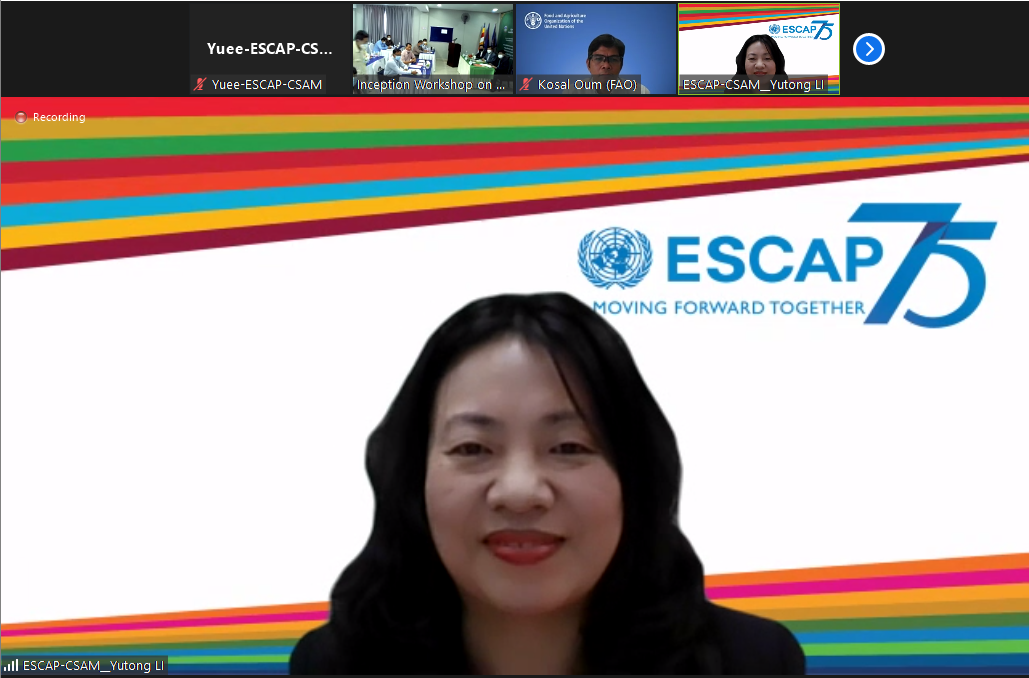CSAM and Partners Organize Inception Workshop of Pilot Initiative on Integrated Straw Management in Cambodia
 An Inception Workshop on “Enabling Sustainable and Climate-smart Agriculture in Cambodia through Mechanization Solutions for Integrated Management of Straw Residue and Air Pollution Monitoring” was held today at Calao Hotel of Kep Province in Cambodia. The event, conducted in a hybrid format (on-site and online), was co-organized by the Centre for Sustainable Agricultural Mechanization (CSAM) of the United Nations Economic and Social Commission for Asia and the Pacific (ESCAP); the Department of Agricultural Engineering of the General Directorate of Agriculture, Ministry of Agriculture, Forestry and Fisheries of Cambodia; and Swisscontact.
An Inception Workshop on “Enabling Sustainable and Climate-smart Agriculture in Cambodia through Mechanization Solutions for Integrated Management of Straw Residue and Air Pollution Monitoring” was held today at Calao Hotel of Kep Province in Cambodia. The event, conducted in a hybrid format (on-site and online), was co-organized by the Centre for Sustainable Agricultural Mechanization (CSAM) of the United Nations Economic and Social Commission for Asia and the Pacific (ESCAP); the Department of Agricultural Engineering of the General Directorate of Agriculture, Ministry of Agriculture, Forestry and Fisheries of Cambodia; and Swisscontact.
CSAM and the Environment and Development Division of ESCAP are implementing a two-year regional project titled “Enabling Sustainable and Climate-smart Agriculture in Cambodia, Indonesia and Nepal through Mechanization Solutions for Integrated Management of Straw Residue and Air Pollution Monitoring”. With financial support from the China-ESCAP Cooperation Programme (CECP), the project aims to promote agricultural machinery-based solutions to address the shared problem of straw residue burning that leads to adverse impacts on agriculture as well as serious environmental and public health consequences. The Workshop convened today was part of the in-country project activities in Cambodia being implemented in partnership with the Department of Agricultural Engineering and Swisscontact, and followed a similar workshop organized in Nepal last month.
In her remarks at the Workshop, Dr. Yutong Li, Head of CSAM, pointed out that “In order to address the adverse impacts of straw burning, various approaches are being applied, although in fragmented ways, across different countries to utilize straw as fertilizer, fodder and other purposes. However, one of the main constraints to improve and synthesize these approaches is the lack of reliable agricultural machinery and equipment.” She further underscored the importance “to test and promote integrated models of utilizing straw, with a focus on enhancing the performance of relevant machinery in specific local contexts.”
To facilitate the active engagement and support of key national, provincial and community-level stakeholders in Cambodia, the Inception Workshop presented the objectives and main activities of the Cambodia country pilot, the current progress, and potential machinery-based solutions to be applied at the pilot site.
Relevant departments of the General Directorate of Agriculture of the Ministry of Agriculture, Forestry and Fisheries, Takeo Province, and Traing District; experts from CSAM and ESCAP’s Environment and Development Division; a representative from the Food and Agriculture Organization of the United Nations in Cambodia; local farming community members and other domestic stakeholders took part in the event which saw rich discussion among the participants. Overall, the Inception Workshop was attended by approximately 50 participants both on-site and online.
ESCAP-CSAM’s wider initiative on ‘Mechanization Solutions for Integrated Management of Straw Residue in Asia and the Pacific’, including the current two-year project, has also recently been cited as one of 80 good practices in a newly released publication titled “Good Practices in South-South and Triangular Cooperation in LDCs: From the Istanbul Programme of Action to Achieving Sustainable and Resilient Development” which has been jointly developed by the United Nations Office for South-South Cooperation (UNOSSC), the United Nations Capital Development Fund (UNCDF) and the United Nations Office of the High Representative for LDCs, LLDCs and SIDS (UN-OHRLLS), in partnership with the Qatar Fund for Development (QFFD).
